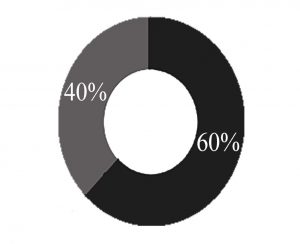
Serena Williams challenges a referee, claiming an unfair call was made against her. photo Google
Sexism is real. In sports, it’s an everyday reality.
It exists whether you believe in it or not for it hurts people, holds them back, denies them opportunities, makes their lives more difficult and changes even the most straightforward challenges, and it doesn’t even need to be acknowledged to do so.
The issue of sexism in sports came to light once more in early September when Serena Williams lost the US Open final to Naomi Osaka.
Williams was cited three penalties during the match. The first a warning for receiving coaching; the second a point
deduction for breaking her racket; the third a game penalty for verbal abuse after she called the umpire, Carlos Ramos, a “thief.”
Williams then accused Ramos of sexism during a news conference the next day.
The issue that enraged people all across the globe, and what tennis player, Billie King, tweeted is that “when a woman is emotional she is “hysterical” and she’s penalized for it. When a man does the same, he’s “outspoken” and there are no repercussions.”
Men in tennis have berated chair umpires in the past, and yet there has not been a single game penalty. John McEnroe has his famous saying of “you can’t be serious” that as a society, we celebrate and
commercialize it.
Would the umpire have done the same to a man? History has said, no. Male tennis players came to Williams’ side where retired US tennis player, Andy Roddick tweeted, “I’ve regrettably said worse and I’ve never gotten a game penalty.”
Dominic Thiem smashed multiple rackets this tennis season. At the Rome Open in May, the Sky Sports commentary observed: “Broke it in style, didn’t he? Not condoning it, but you can understand his frustration.” Thiem broke his racket yet another time in the US Open, and the media chose to focus on the fact that he gave his broken racket to a fan.
Williams, on the other hand, was handed a penalty for the same fact and the headlines screamed about how awful of a thing she did.
Why not focus on her redemption after losing her cool? Williams insisted her fans celebrate and applaud Osaka for the win.
Williams is also not the only woman to recently have found herself at the top of the gender-controversy discussion. French tennis player, Alize Cornet, received a code violation in one of her US Open matches for briefly taking off her shirt in order to fix it, because the shirt had been on backwards.
The US Open did release a statement later claiming that they apologize for Cornet’s treatment, but she still had to go through the humiliation of being told that she was to be punished for her body.
According to the US Open all players are allowed to change their shirts while sitting in their chairs while female players have the option to change shirts in “a more private location close to the court, when available.” In fact, many male players have changed their shirts on the court without a problem.
In the same tournament, John Isner changed his shirt eleven times throughout the course of his match, and Novak Djokovic sat shirtless for several minutes while his opponent stepped away to change his shirt during a quarterfinals match. Neither of them was penalized.
Williams was rightfully appalled at Cornet’s and her own treatment.
“For me, it blows my mind. But I’m going to continue to fight for women and to fight for us to have equal — like, Cornet should be able to take off her shirt without getting a fine. This is outrageous. I just feel like the fact that I have to go through this is just an example for the next person that has emotions and that want to express themselves and want to be a strong woman. They’re going to be allowed to do that because of today. Maybe it didn’t work out for me, but it’s going to work out for the next person.” Williams said.
In sports, in particular, we as women constantly get mixed messages on what is “appropriate” or “right” in the terms of our behavior or our dress. Another example is when gearing up for the 2012 Olympics, the Badminton World Federation stated that all female players playing at an elite level had to wear skirts or dresses.
Their goal was to make the women competing seem more feminine and therefore, more desirable to their audiences.
In other words, women must sacrifice their bodies, and the way people see them in the name of impressing and drawing the attention of men.
One would think that in this modern day and age, women would be able to wear what they wanted and what was most comfortable and efficient for them to play in.
Women constantly have to break down barriers in the sports world. We are constantly reminded that we are not men, as if that should be taken as an insult. Williams is fed up with the unjust treatment of women and the views that

We asked 50 students at Godwin who follow The Eagles’ Eyrie Instagram, “Do you feel Serena Williams was justified in her actions at The US Open?” The above digraph shows their responses to the question. The darker section represents those who believe she was justified in her actions, and the lighter section represents those who believe her actions were not justified.
society has on the comparison of male and female athletes.
“People call me one of the “world’s greatest female athletes”. Do they say LeBron is one of the world’s best male athletes? Is Tiger? Federer? Why not? They are certainly not female. We should never let this go unchallenged. We should always be judged by our achievements, not by our gender,” said Williams.
In sports, it seems that women can never have a victory, and in reality, these are issues that are at work in all of our lives, and just like it has many other times, the games we love force us to confront that which we’d rather ignore and maybe don’t even understand.
